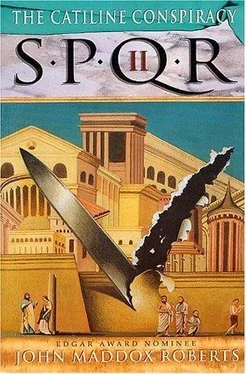John Roberts - The Catiline Conspiracy
Здесь есть возможность читать онлайн «John Roberts - The Catiline Conspiracy» весь текст электронной книги совершенно бесплатно (целиком полную версию без сокращений). В некоторых случаях можно слушать аудио, скачать через торрент в формате fb2 и присутствует краткое содержание. Жанр: Исторический детектив, на английском языке. Описание произведения, (предисловие) а так же отзывы посетителей доступны на портале библиотеки ЛибКат.
- Название:The Catiline Conspiracy
- Автор:
- Жанр:
- Год:неизвестен
- ISBN:нет данных
- Рейтинг книги:3 / 5. Голосов: 1
-
Избранное:Добавить в избранное
- Отзывы:
-
Ваша оценка:
- 60
- 1
- 2
- 3
- 4
- 5
The Catiline Conspiracy: краткое содержание, описание и аннотация
Предлагаем к чтению аннотацию, описание, краткое содержание или предисловие (зависит от того, что написал сам автор книги «The Catiline Conspiracy»). Если вы не нашли необходимую информацию о книге — напишите в комментариях, мы постараемся отыскать её.
The Catiline Conspiracy — читать онлайн бесплатно полную книгу (весь текст) целиком
Ниже представлен текст книги, разбитый по страницам. Система сохранения места последней прочитанной страницы, позволяет с удобством читать онлайн бесплатно книгу «The Catiline Conspiracy», без необходимости каждый раз заново искать на чём Вы остановились. Поставьте закладку, и сможете в любой момент перейти на страницу, на которой закончили чтение.
Интервал:
Закладка:
"I would suggest you do that very soon," Asklepiodes advised. "It will do little good if you delay until the conspirators kill him." That seemed to be most reasonable advice.
I rose. "I'll leave you now. I look forward to news of your death."
"Try not to grieve," he said.
I went to the Temple of Saturn without attracting notice. My celebrity had already staled. Such is the nature of glory. I spent a profoundly boring but restful day amid the wealth of the empire. I attended the baths, bandages and all, and pondered my next move. I resolved to call upon Cicero that evening.
As I was leaving the bath, I encountered my father entering amid a knot of his cronies. I greeted them all and received their congratulations for my performance at the festival, then steered my father aside for a private talk. We went to one of the niches that lined the walls of the atrium and stood beneath a statue of Bellona.
"What do you want? Be brief," he said in his usual solicitous fashion.
"How is the situation with Hortalus?" I asked.
"He is enjoying his retirement too much, but I think he'll decide to stand for Censor. He knows there is no rush and I suppose he's waiting for half the Senate to go out to his country house in a mass and beg him to come out and save the Republic or some such." I told him what Crassus had said and he nodded, pleased. "I knew that this marriage-tie with the Crassi would be wise. I wish my niece Caecilia would hurry up and produce a grandchild for Marcus. He's not so bad, you know, despite his obscene obsession with accumulating money." The only way in which Marcus Crassus differed from most of his contemporaries in regard to money was his expertise in acquiring it. That, and his extraordinary honesty about it. There was supposed to be something unaristocratic about money. It was beneath the dignity of a wellborn man. What it meant in practice was that you robbed provinces when you could and left the money-grubbing to your freedmen.
"Has Hortalus had… oh, visitors, that you know of?" This was incredibly lame, but I could not think of a good way to phrase it. Father and Hortalus were great friends and Father would probably know if any of Catilina's men had approached the old fraud.
"What? Visitors?" He fixed me with a withering glare and I knew I had misstepped. "What sort of man does not have visitors? Quintus Hortensius Hortalus is one of the most distinguished men of his generation. Of course he has visitors! What are you getting at?"
I decided to get off that subject and ask something that had been troubling me but that I had not thought to ask him about.
"Father, were my mother and Orestilla close friends?"
He was startled by the change of subject, but years of legal practice had made him nimble on his mental feet, if I may use an awkward metaphor.
"You mean the wife of Sergius Catilina? Not that I know of. They must have known each other, attended the rites of Bona Dea, that sort of thing. All Senators' wives know one another, but I never heard that Servilia was especially close to Orestilla, as she was with Antonia the Younger and Hortensia. Orestilla's a scandalous woman, anyway. Why do you ask? What are you up to, you young reprobate?"
"All shall be made clear in time, Father," I assured him. "I am working on a delicate matter of crucial importance to the state."
He was utterly unimpressed. "I shall be pleasantly surprised to learn that you have been working on anything at all. Have you any further excuse for detaining me?" I had none and he left. It would never have occurred to him to inquire about my injuries. He probably thought that bandages were effeminate. No doubt I should have just left my wounds open and dripped on the pavement, in manly Old Roman fashion.
It was still early in the afternoon and I did not want to be seen going to Cicero's house. As I descended the steps of the public bath I noticed one of the monuments that seem to spring up overnight in Rome, like mushrooms. It was one of several that Crassus had erected to himself. To Crassus, modesty was for men who had good reason to be modest. This one commemorated his victory over Spartacus. Monuments to that event were considered by most Romans to be in extremely poor taste. Everyone loved commemorations of a foreign victory, but a slave rebellion was best forgotten. His real monument had been the six thousand crosses he had erected along the Via Appia between Rome and Capua, where the rebellion had begun. Gawkers from Rome and the towns along the road had gone out for days to witness the mass execution. The record for longevity was held by a burly Gaul who had taken eight days to die.
Now, thinking of Crassus in connection with Catilina and his boneheaded conspiracy, I saw the monument differently. Crassus was reminding the Romans that he had saved them from what they feared the most and would never admit to. Old Mithridates might have been fearsome, but he didn't live in your own house, in a position to cut your throat while you slept, should he take the fancy to.
Like many of the great men of that time, like Catilina himself, for that matter, Crassus had grown rich in the Sullan proscriptions. He had hunted down and killed men whose names Sulla had published in the Forum and had collected their estates as reward. Before the proscriptions, at the end of the civil war between the adherents of Marius and those of Sulla, it had been Crassus who had led a Sullan army that smashed the rebel Samnites outside Rome's Colline gate, a fight that Romans had witnessed from atop the wall as if it were being staged in the Circus for their edification. Crassus had won the battle, but Sulla had taken the glory. Ten years later, he had defeated Spartacus. That time, it had been Pompey who had stolen the glory.
Crassus was a man badly in need of glory. He had held the highest offices and seemed to own half the money in the world, so glory was all that was left. Did he want it badly enough to take Rome by coup? Rome itself was the one thing Pompey had not yet taken. If so, it meant that Crassus had finally gone mad, as had Marius in his later years, yet I did not think so. He might be playing some deeper game, one that was as hidden from Catilina as it was from me.
I was thinking about Crassus because I did not want to think about Aurelia. Was she no more than bait, a form of bond to keep me attached to Catilina and his cause? If so, he had discerned my weakness with an astuteness I would not have given him credit for. She bedazzled my mind and senses like no woman since-well, since Clodia. Was my susceptibility to women now common knowledge?
Asklepiodes had once said to me: "Young men are easily led about by the masculine member. You are one of the few I have known who are intelligent enough to know when it is being done to him yet susceptible enough to allow the process to continue regardless."
Had someone-Clodia, perhaps-told Catilina that nothing was necessary to secure my participation except to dangle a beautiful woman before my aristocratic nose? That I would then become the most malleable of clay, as my lower organs seized control from my brain? I did not know. I did know that I wanted Aurelia again, and felt that I could never get enough of her.
Cicero's house was near the Forum, a small but elegant dwelling that he maintained to be close to the seat of government. He had other houses both in the city and in the countryside, but during the fall and winter he was usually to be found in this one. Many Romans retired with the onset of darkness, but I knew that Cicero always worked late into the night. The janitor asked my business when I called at the front door.
"The Quaestor Metellus," I said, in a low voice, "to see the Consul on an urgent matter." The janitor said something to a slave boy who ran off into the interior of the house. A few minutes later Tiro appeared and admitted me. Tiro was Cicero's secretary and close companion, so indispensable that he was almost as famous as Cicero himself.
Читать дальшеИнтервал:
Закладка:
Похожие книги на «The Catiline Conspiracy»
Представляем Вашему вниманию похожие книги на «The Catiline Conspiracy» списком для выбора. Мы отобрали схожую по названию и смыслу литературу в надежде предоставить читателям больше вариантов отыскать новые, интересные, ещё непрочитанные произведения.
Обсуждение, отзывы о книге «The Catiline Conspiracy» и просто собственные мнения читателей. Оставьте ваши комментарии, напишите, что Вы думаете о произведении, его смысле или главных героях. Укажите что конкретно понравилось, а что нет, и почему Вы так считаете.










